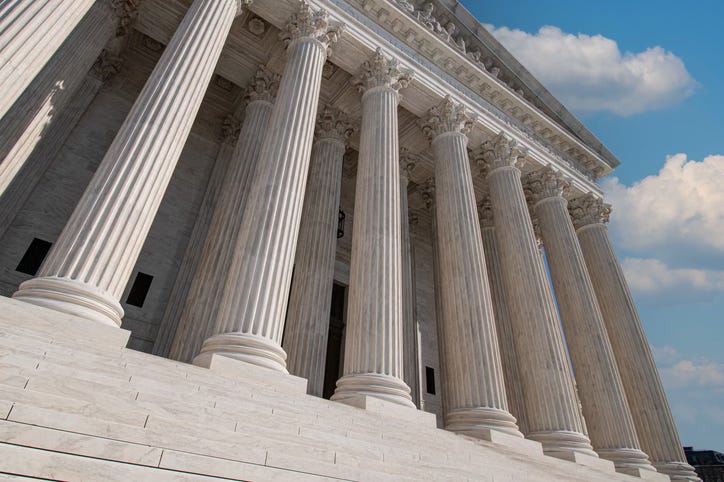Amy Coney Barrett Saved Democracy
Thwarting petty tyrants in obscure courtrooms is republic-saving work
Amy Coney Barrett just saved democracy.
No, really, she did. Look it up. It happened last Friday.
These days it’s fashionable to vamp one’s selfless electoral actions to save democracy and now I can give you mine.
In my view the single most compelling argument for Donald Trump’s re-election in 2020 was his last act: having the moxie to jam Amy Coney Barrett’s Supreme Court nomination down the molasses throat of the U.S. Senate in just a few weeks. Voting had already begun in five states at the time. The Washington salon was aghast. There’s no way Jeb Bush, Ted Cruz, or John Kasich – the Republicans Trump beat - would have had the fortitude to make that pick stick.
From the moment Trump hit the gas on his third justice in a mid-pandemic White House Rose Garden ceremony, I expected that audacity would prove important for the Republic. Justice Barrett has proven me right.
Friday she wrote for the Supreme Court majority in Trump v. Casa, the birthright citizenship case, in which a lower court judge issued a nationwide injunction thwarting implementation of a Trump executive order ending automatic citizenship for anyone born on American soil, regardless of parentage. Barrett’s opinion does not take sides on the order, but the ability of a district court to capriciously stop national policy. In less than six months, Trump has been subject to 40 nationwide injunctions, and 90 percent of them have come from just five district courts that are particularly liberal. It’s legislation by adjudication and it’s corrosive to free society.
In assembling a Supreme Court majority to thwart this practice, Justice Barrett has saved democracy. Policy should be made by those elected by, and responsive to, the citizenry. Judges, appointed for life, are neither. Her decision has one foot grounded in originalism, for the right, and one in the separation of powers, giving honest liberals a handle to grasp. Trump’s second term has revived lefty love for the separation of powers and Barrett’s rationale feeds it.
“A universal injunction can be justified only as an exercise of equitable authority, yet Congress has granted federal courts no such power.”
For readers too thick to get it, she re-iterates this in the footnotes, making clear she is not giving away the Supreme Court’s constitutional legislative review role.
“Our decision rests solely on the statutory authority that federal courts possess under the Judiciary Act of 1789. We express no view on the government’s argument that Article III forecloses universal relief.”
That footnote may be intended for one particular reader, fellow Justice Sonia Sotomayor, who argues, without so much as a knowing wink, that Barrett’s rationale is premised on an understanding of the Judiciary Act of 1789 frozen “in amber,” which of course it should be, until Congress amends it. Barrett’s summary of Sotomayor’s defense of nationwide injunctions is that they can “serve important policy objectives.” But it’s not the job of judges to make policy, important or not, good or bad, popular or hated. That’s the job of the elected.
The Court’s majority opinion gets down to the practical nub that sticks in the craw of this President’s supporters (and the last President’s, when it happened to him) – the fundamental inequality of a single random judge bringing a halt to the implementation of a national mandate.
“universal injunctions operate asymetrically: A plaintiff must win just one suit to secure sweeping relief. But to fend off such an injunction, the government must win everywhere.”
In a separate concurring opinion, Barrett’s fellow Trump Justice, Brett Kavanaugh, emphasizes that this decision is meant to restrain district judges from making national decisions, not to abdicate the Supreme Court from doing its national job.
The separation of powers is the genius of American governance, and judicial review a key lever in it. Executive power has been expanded far beyond my personal comfort level, starting long before this president took office. Congress, under both parties, is culpable in that devolution of power and it makes our system rickety, or at least squeaky, when pushed. The Supreme Court must be the stabilizer, and Kavanaugh agrees:
“In justiciable cases, this Court, not the district courts or courts of appeal, will often still be the ultimate decisionmaker…When a stay or injunction application arrives here, this court should not and cannot hide in the tall grass. When we receive such an application we must grant or deny.”
Kavanaugh’s expression of determination for the court to consistently engage is notable, as he has sometimes looked for categorical exclusions that might get the Supreme Court out of the business of weeding the garden, and he’s pushed back on the need for the court to make quick decisions on its “shadow docket,” deciding whether to act on stays from lower courts. Barrett may have moved him.
Creating a Supreme Court that reliably acts swiftly, rules certainly on the basis of black letter law and original intent, and constrains itself to judicial review and not policy-making will be a democracy-saving exercise. That’s Barrett’s objective.
Our polarized country has a legislative branch now lashed to small and volatile majorities. Our term-limited executives are now consistently chosen within predictably tight ranges. Party control of government now flips regularly but narrowly. The voting public is checking its own government at the ballot box. That’s grimy democracy, but democracy still. Anonymous junior judges in unknown courtrooms wielding blanket monopoly power threaten that ugly balance.
Regardless of what else she does in the next thirty years – and actuarial tables tell us Amy Coney Barrett of New Orleans, Rhodes College and the Notre Dame School of Law, has that much more time on the bench if she wants it – we should thank her already for saving democracy from its most obscure appendages.






